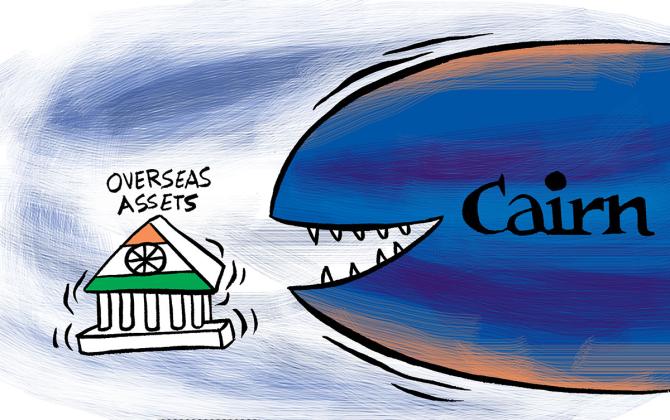
India’s Cairn and Unable Moment
The Indian State does not believe in the rule of law. It does not even recognise the need to follow treaties that it itself signed.
And so it is refusing to shell out to Cairn; and, as a consequence, has brought on the Paris humiliation, notes Mihir S Sharma.
When a French court declared in favour of Cairn Energy plc earlier this month, allowing property owned by the Indian government in Paris to be frozen — which the company said was a prelude to it taking full ownership of those properties — it was a new form of international humiliation for India.
For some, it felt like a reminder of the dark days three decades ago when India faced a balance of payments crisis and its global property was in danger of being sold off.
But for many in the international investment community, the headlines about seizure of Indian properties were a simple reminder that doing business in India comes with a greater than tolerable risk of government arbitrariness and the catastrophic loss of capital.
Just a reminder of what this dispute is about, and its absurd longevity, is depressing.
The transaction in dispute took place in 2006; liberalisation itself was exactly as much in the past in 2006 as this transaction is today.
In 2014, the tax department decided that the 2012 “retrospective” amendment meant it should try and tax Cairn — which had already effectively exited India in 2011 by selling out to Vedanta.
Over the next few years, it confiscated Cairn’s shares in Vedanta, it withheld tax refunds, and seized dividends and other income that rightfully accrued to Cairn.
Unfortunately for the taxman, unlike many Indian entrepreneurs, Cairn had nothing to lose if it took on the Indian government.
So it fought, and in December last year won, international arbitration under the UK-India bilateral investment treaty.
But the Indian State does not believe in the rule of law.
It does not even recognise the need to follow treaties that it itself signed. And so it is refusing to shell out to Cairn; and, as a consequence, has brought on the Paris humiliation.
Nor will the loss in France — which, absurdly, includes the official residence of the no 2 Indian diplomat there — be the last such instance.
Cairn has the option of filing cases for enforcement of the arbitration tribunal’s $1.4 billion award in any of 160 jurisdictions.
It is a small company, but it is not alone; also last year, the consortium of investors known as Devas, who had their agreement with ISRO’s commercial arm Antrix nullified in 2011, won a $1.4 billion award at arbitration.
They may collaborate with Cairn in some jurisdictions, and file additional enforcement requests elsewhere. And, of course, Cairn itself is perfectly able to sell on enforcement rights to a larger company that specialises in such actions, and which for all we know might force India to respond in all 160 jurisdictions.
Was all this foreseen by the Indian government? If not, why not? If it was, why did it punch itself in the face anyway?
The answer lies in four pathologies that define the Indian State, and which it has failed to overcome.
First, a lack of judgement. Second, a lack of capacity. Third, a lack of competence. And, most importantly, a lack of humility.
Judgement
I do not mean, here, the judgement required to avoid counter-productive tax amendments, or even the judgement that would prevent an absurd tax demand.
That is perhaps asking too much. No, the real problem is that the Indian State does not even seem to have sufficient judgement to back out even after all rational observers agree that it is certainly losing more than it gains.
On this occasion, that should have happened some time into the arbitration, when its lawyers would have realised that it was losing its case.
In general, the Indian State finds it impossible to settle disputes even when doing so would be the well-judged thing to do; this is not just because its officials themselves lack judgement and foresight, but also because they have no career incentives to settle — and every reason to never compromise with the private sector, for fear of later accusations of corruption or cronyism.
Domestically, this leads to the tendency to appeal adverse tax rulings, which they can often get away with thanks to the inefficiency of the Indian legal system. But they can’t do that with international arbitration, and so their lack of judgement is revealed.
Capacity
Another country with greater State capacity might well be able to identify those locations where it is most at risk of arbitration enforcement, and take pre-emptive action.
It might be able, even, to fight enforcement in dozens of different jurisdictions. India cannot.
The number of people within the State machinery that understand complex issues like international law is minimal.
The number of people outside the State machinery that would be trusted to advise the Indian State on this subject is probably as small, given that the current administration has reinforced and supported generalist Indian bureaucrats’ traditional disdain for expertise.
Domestically, the lack of capacity in the Indian executive branch does not matter because there is an even greater bottleneck in the judicial branch.
Thus they can stay one step ahead of the judges most of the time. But, again, they can’t do that in international arbitration.
Competence
The Indian State prefers incompetence in its officers and hirelings, which is unthreatening; or at best mediocrity.
Please don’t take my word for it: This is the view of no less an authority than the late Arun Jaitley, who when he was Union finance minister in 2017 reportedly complained to the prime minister’s office that “under various bilateral treaties, there are 23 arbitrations that are on, where the Government of India is not being adequately represented.”
He added that the government was not engaging “lawyers of adequate stature”.
There was, in fact, a basic lack of competence in how these issues were being approached.
Nor were boasts that “hard work” could replace “Harvard” true: the then minister of finance, defence and corporate affairs went on to point out that “there is no co-ordinating ministry which is following it up on a day-to-day basis”.
Billions of dollars may be lost because there was nobody competent to understand these issues in government (except perhaps Jaitley himself), nor did the government wish to hire competent lawyers.
This is, of course, a crisis elsewhere in the system — it is why private-public partnerships failed.
The Indian State can neither write contracts nor read them. Nor can it read the writing on the wall.
Humility
This is, in the end, the worst offence. And it is the most foundational.
The Indian government believes that it writes the law, and is therefore above it.
It imagines that any mid-level bureaucratic functionary’s interpretation of domestic tax law or international treaties is, by definition, more accurate than that of a domestic court or a global tribunal.
It cannot accept it is wrong. More, even when it is wrong, it will insist it does not matter.
So what if investors worldwide have been shown that India is where you go if you want the government to try and bully you out of your money?
The only way that 30 years of liberalisation has changed the Indian State is by endowing it with a bone-deep arrogance, a certainty that no matter what it does or how it fails, the investment will keep coming.
This lack of humility, this unearned confidence, is not just the central reason that India fights and loses arbitrations — it is the reason that a three-decade-long growth engine is grinding to a halt.
Mihir S Sharma is head of the Economy and Growth Programme at the Observer Research Foundation, New Delhi.
Feature Presentation: Rajesh Alva/Rediff.com
Source: Read Full Article

